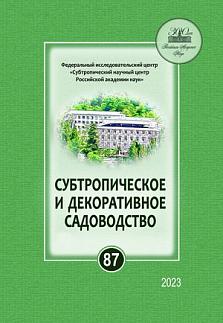Ethics of scientific publications
In order to improve the quality of scientific works, to ensure the authors’ rights to intellectual property and to avoid unfair practices in publishing activities, the editorial board of the journal" Subtropical and ornamental horticulture" adheres to the principles of publication ethics fixed in the following documents:
- Recommendations of the Committee on Publication Ethics – COPE;
- Declarations "Ethical principles of scientific publications" developed by the Russian Association of Science Editors and Publishers (ASEP);
- Civil code of the Russian Federation (part 4, section VII);
- Federal law of 29.12.1994 N 77-FZ"about the obligatory copy of documents".
ETHICAL PRINCIPLES OF SCIENTIFIC PUBLICATIONS
Editorial board, authors, reviewers, publishers, and institutions involved in the publishing process are required to comply with ethical standards, rules and regulations, and have responsibility for the publication of copyright works, which entails the need for all parties to comply with the following obligations:
The author is obliged to observe the rules indicated in the sections "Paper formatting", "Copyright" and "Paper publishing”
The author has the right to:
Appeal the decision on violation. All appeals must be submitted to the editorial board in writing within 30 days from the date of notification of the decision. The appeal must include a rebuttal of the decision, with a detailed explanation why the decision was wrong.
The reviewer is obliged to:
- inform the editor-in-chief about the conflict of interest (dual commitments, competing interests) and withdraw from the manuscript review;
- follow the rules of the section “Paper review”.
Conflict of interest
In order to avoid violation of the ethics of scientific publications, the conflict of all parties’ interests involved in publication process should be excluded. A conflict of interest arises if author, reviewer or member of the editorial board has financial, scientific or personal relationships that may affect their actions. Such relationships are called dual obligations, competing interests or competing loyalties.

 Publish article
Publish article